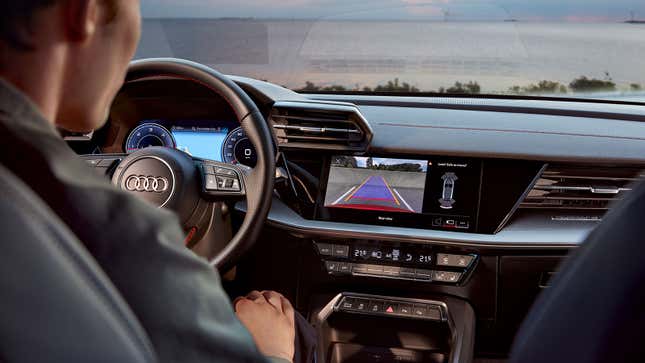
Audi has issued a massive recall for a swath of new models due to an issue that prevents the backup camera feed from displaying when shifting into reverse. According to National Highway Traffic Safety Administration notice 21V825 an estimated 2,857 vehicles may be affected, consisting of select 2021 and 2022 nameplates:
Volkswagen Group of America, Inc. (Audi) is recalling certain 2021 Audi A8 and S8, 2022 Audi A5 Sportback, A4 Sedan, E-Tron GT, Q3, Q5, RS6 Avant, A3 Sedan, S5 Sportback, Q5 Sportback, Q7, Q8, RSQ8, SQ7, SQ8, and S3 Sedan vehicles. A software error may prevent the rear-view image from initially displaying when the vehicle begins to reverse. As such, these vehicles fail to comply with the requirements of Federal Motor Vehicle Safety Standard number 111, “Rear Visibility.”
That’s not quite every Audi in the current North American lineup, as you’ll notice the A6, A7, TT and R8 are not present in that group. However, the Q3 — the Ingolstadt-based company’s most popular product — certainly is.
The glitch pertains to software but cannot be remedied with a simple over-the-air update. That means owners of affected vehicles will have to bring their cars in for service. Notices are reportedly due to be mailed at about the middle of December but, as always, you can check if your new Audi is included in the list by inputting your VIN number on the NHTSA website.
Audi is far from the only carmaker dealing with backup camera problems in recent months. The latest-generation Volkswagen Golf, manufactured before July of last year, also faced a big recall for a similar issue. Mercedes-Benz recalled 375,000 cars between model years 2019 and 2021 due to blank screens in reverse gear and unexpected infotainment system reboots. In that case, however, the company was able to fix things remotely.
The list goes on. Ford recalled 620,000 cars barely more than a year ago — an action the NHTSA probed this past summer to determine if customers were notified quickly enough. BMW too suffered a backup camera-related recall, which notably covered the Toyota Supra and some Rolls-Royces. Fiat Chrysler had one in 2020 — though the problem there wasn’t the video feed failing to display, but rather failing to turn off after shifting out of reverse. In fact, the just-released 2022 Jeep Grand Cherokee L has already been recalled for various infotainment system bugs, one of which concerns the backup camera.
Backup cameras have been standard equipment across various makes and models for the better part of a decade now, with the NHTSA legally requiring them on all new cars beginning in May 2018. Many manufacturers moved to implement them swiftly before the 2018 deadline, though some nameplates still lagged upon the 11th hour. I can tell you from experience that the 2017 Ford Fiesta ST did not have a backup camera, even while other Fiesta models did.
Considering automakers have been employing backup cameras for some years already, it’s surprising that this has become a common issue as of late. Then again, infotainment systems today are significantly more complex than they were even just five years ago, handling a vastly greater number of duties, too. The problem is compounded by the fact that software is often shared throughout a manufacturer’s range of cars. If a glitch in code crops up in one model, chances are high it’ll, erm... rear its ugly head in others, too.
